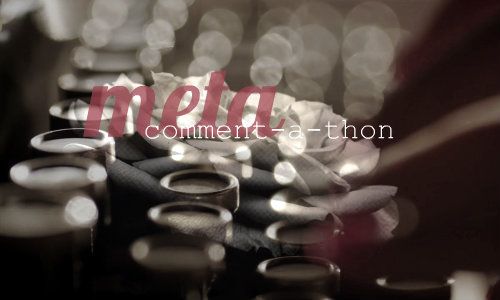FREE-FOR-ALL META COMMENT-A-THON
Old news: lj is dead. Everyone is crazy busy, or they have other reasons not to be here. No one has time to read those huge meta posts we used to write once upon a time. But maybe we can all find ten minutes to do this:
FREE-FOR-ALL META COMMENT-A-THON!

( Read more... )
FREE-FOR-ALL META COMMENT-A-THON!

( Read more... )
Britta and Annie, however, are both frequently objectified as sexual objects. [In writing all of this out, the racial implications are very apparent to me all over again, but uh, we'll discuss that later too.] Shirley is minimized as a sexual being because she's older, because she's a mother, and because she's non-white. Britta, despite her feminist standpoint, curls her hair, wears high heels, and tries to make herself attractive. The show points out that seemingly contradiction in behaviour pretty often which makes Britta, the character, funny but also effectively allows the show to objectify one of the main female characters and not get called out on it because it's a quirk of the character, not a problem in society.
Annie's objectification is actually laid out pretty flatly for what it is. Generally speaking, it's presented with minimal comment. Annie moves, her breasts are displayed and moving in some way, and they focus on it. It's happened most often from season two onward. The discussion around 'not sexualising her, she's young' ceased for the most part and Annie was allowed to turn into a sexual object. This has bled into off-screen media re: Gillian Jacobs and Alison Brie and vice versa - the show knows that people watching the show want to see Britta and Annie as sexual objects and it delivers and this feeds mass media depictions which reinforce/reiterate the same.
This doesn't happen with Joel McHale nearly as much but it happens with Jeff Winger. One of the most interesting things about Jeff is that he presents himself without any shame as a sexual object. Jeff has some agency in his objectification - he actively pursues it and does not enjoy losing his sexual allure/power in any way, shape or form. His need for sexual validation comes from vanity and ego, yes, but also, likely, has to do with childhood trauma and how it played out in his life (abandonment, unrealistic expectations, bullying, etc.) You rarely, if ever, see Joel McHale pictured shirtless which I think speaks to some of the ways in which the male characters versus female characters are objectified differently. More over, Jeff is someone to be admired because of the way that he attracts women (and men) with his physical beauty. Jeff derives power from his objectification - some of it, I would argue, comes his inherently more powerful social position as a male and some comes from his consent and active participation in his own objectification. Jeff wants women, he works to look good, which attracts him women - there's a transaction there, but Jeff is both payee and payor.
Reply
For Britta, she both desires and rejects the male gaze. She is ashamed of wanting to be desired even as she works to be desired. Britta is shamed (largely by Annie and Shirley) on different occasions for her clothing, her behaviour, and her desire/pursuit of conventional beauty. Jeff is Britta's most obvious counterpart (similar age, both white, attractive, main characters) and while he's presented as admirable, she is presented as ridiculous. This is how the character was designed and has evolved. And it leads to an uncomfortable competitive Madonna/Whore complex (or Betty/Veronica pairing, if you prefer) between Britta and Annie which is wholly unnecessary and unwelcome for most fans (I hope).
For Annie, she is only just learning about her own sexuality and sexual power - but honestly, the show never actually develops how she feels about that so it's hard to really say whether Annie rejects the male gaze. I think she uses it to her advantage, in some ways, but for the most part, she's actually an object, not even an unwilling participant because that requires some level of awareness and engagement of what's happening. I tend to agree with baller_annie that Annie's character development throughout the series has been largely stunted and they've been stuck on this idea that she's too young to be sexualised while overtly sexualising her. It's a weird position, a catch-22, for both the character and the show because they can't explore any of her opinions and feelings around being a love interest, being a sexual person, or growing up without sacrificing either the sexualisation or the tagline around her being too young.
I ended up rambling a bit, but I hope this mostly made sense. I kind of want to discuss the racial implications and Shirley as the monstrous mother but... Another time. Great topic!
Reply
Leave a comment